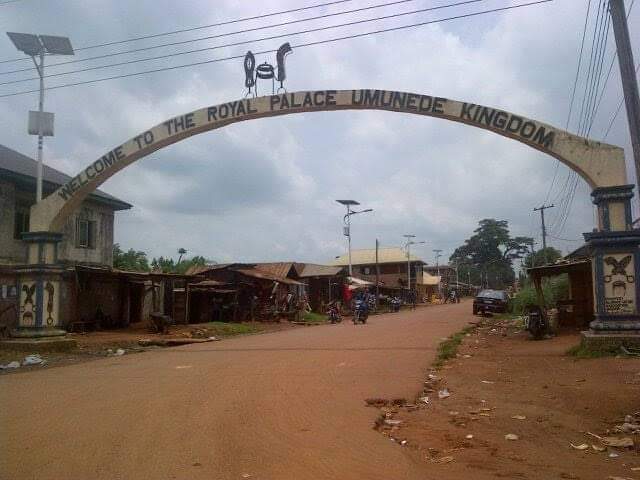Brief History of UMUNEDE KINGDOM

Brief History of UMUNEDE KINGDOM
UMUNEDE KINGDON is situated on a plateau about 15 kilometers from Agbor in the West and 56 kilometers from Asaba on the East.
Umunede is not only centrally located in Ika, she is also so suitably located that it serves both as a major commercial/business center of Ika people as the vital corridor through which all the neighboring towns and villages evacuate their farm produce to all parts of Nigeria.
Umunede Kingdom was claimed to have been founded by a Benin Prince, called EDE and his wife, IYE who migrated from Benin and settled in the present location, later known as Umunede. The exact date of migration of Ede and his wife from Benin was not recorded but generally, historians put the approximate period as the Thirteenth Century A.D., during the reign of Oba Ewedo The Great (1250-1280 A.D.) Umunede Kingdom is one of the oldest kingdoms east of the Benin Empire.
Historians had contended that during Oba Ewedos reign, the Oba had two battles to fight: a diplomatic battle against the great nobility led by the Ediommehan and military battles against Ogiamien III in order to destroy once and for all this anti-royalist movement. As a result of these events, many princes and noble men fled with their families to different safe locations.
The second wave of migration to Umunede probably took place under Oba Ewuare The Great (1440-1485). During his reign, an attempt to eliminate members of the nobility who were threatening the monarchy gathered momentum and brought about another wave of migration out of the Benin Empire.
Historical evidence shows that Igbo settlers where in Umunede before Ede and Iye arrived at the location but no one was sure when those earlier settlers arrived. However, later migrations to Umunede were well documented. For example, there were other immigrants from Ishan, Benin-speaking areas and Yoruba areas of the west between the 16th and 19th centuries and their quarters are well known in Umunede.
Also, there have been large number of immigrants from the Eastern Igbo-speaking area since the last quarter of the 19th century and, since the civil war; Umunede has also been witnessing a large number of immigrants from neighbouring towns and villages.
The people that Ede and his followers meet in the present location, later called Umunede were probably not as strong and organized as Ede and his followers. Therefore, Ede was able to impose his rule and leadership upon the earlier settlers. In fact, it has never been contested that Ede brought to Umunede the type of administrative and social structures, which were already in place in the Benin Empire.
Firstly, the monarchical administration, which Ede and his followers brought from Benin, was established in Umunede and hence up to today, Umunede still has traditional and hereditary kingship. Secondly, the mode and type of worship and traditional festivals correspond to the practices in the Benin kingdom. Thirdly, the mode of building houses in ancient Umunede was also that of Benin tradition.
Every available document showed that Ede and Iye had four sons in the following order of seniority: Ilege, Edware, Oba and Ile. Those four sons and their descendants constituted the original four main villages of Umunede. Available information also showed that it took some time before the kingship, as we know it today was fully established. When it was fully established, it took an Igbo title, Obi instead of Ovie or Onogie, which are the titles kings that descended directly from Benin bear
But, why Obi? The main reason was that in the course of centuries of living together and inter-ethnic marriages, each of the various groups living in that location started to lose its original ethnic identity, thus giving way to develop on Unumede (Igbo)language and culture as the dominant tribe. History did not record an alternative title to Obi.
Although the Obiship is based on hereditary lineage (i.e., on succession by first son), this was not the case in Umunede at the beginning of its kingship institution. Contrary to Benin tradition, it was the descendants of Egware, the second son, which established hereditary Obiship in Umunede. This was because, during the life-time of Ede, it was believed that his first son, Ilege, traveled frequently out of Umunede, at times on hunting expedition, and would not return to Umunede until after several weeks or months. Ede feared that Ileje might not understand how to perform traditional rites and rituals required for the survival of the Kingdom. He therefore, before his death, handed over his Staff of office to Egware. Since then, kingship has resided in Obi Village and since kingship is hereditary, the descendants of Egware have been the Obis of Umunede since living memory!
The title, OGELE was conferred on the oldest son, Ilege, and since that time the oldest man in Ilege Village assumes that title. As compensation for losing the Obiship, the Ogele was given the sole authority to crown all the future Obis of Umunede. His Royal Highness, Ezeagwu Ezenwali I, the present Obi and the Agadagidi of Umunede is the 12th in the line of succession of the present dynasty.
Originally, the Staff of Office received from the Obas of Benin by the Obis or the Onogies was only Ebeni. It is, however on record that the Obis of Umunede were among the earliest kings to acquire Adas (very superior Staff of Office reserved for first class Obis) and Ebenis together among the Obis East of the Benin Kingdom.
There are five major communities that make up Umunede Kingdom.
(1) Obi, consisting of the following quarters: Idumu Obi, Oro Egweachime and Ikweme (Isokwe).
(2) ILEGE, consisting of Uhiere, Idumu Afor, Umuojobia, Iba, Ogbeisere and Ogbe Ohun
(3) OBA, consisting of Isiukwa, Ogbeakun and Idumu Ugbo;
(4) ILE, consisting of Ayomuroko, Esegbena and Ozoba; and
(5) NEW ROAD SETTLEMENT made up of recent immigrants to Umunede and younger generations from other villages, of Umunede and to some extent, people from other village of Umunede.





